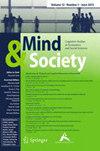Immediate Psychological Responses & Associated Demographic Factors during the Lockdown Period of the COVID- 19 Outbreak among the Bangladeshi University Students
Q1 Arts and Humanities
引用次数: 0
Abstract
The massive spread of COVID-19 has put people’s standard of living in jeopardy. The mental health status of the students has been a matter of concern throughout the lockdown. The study aims to identify university students’ immediate psychological responses as an index of mental health outcomes during the COVID-19 outbreak lockdown period and to investigate demographic predictors of their mental health outcomes. 167 students responded to a web-based cross-sectional survey that included the IES-R and DASS-21BV in addition to demographic data and relevant COVID-19 questions. 49.2% of the respondents reported stress, 54.6% reported anxiety, 64.2% reported depression ranging from mild to extremely severe, based on DASS-21, and 68.9% of respondents rated having a mild to severe psychological impact from the lockdown on the IES-R. Age was significantly associated with the DASS stress subscale (B = -.159, AR2 =.019, 95% CI: -1.023 to -.021). The study ascertains the commonness of the psychological impact of the lockdown period of the COVID-19 outbreak on university students, necessitating immediate intervention to cope with the unprecedented situation and minimize future mental health problems.孟加拉国大学生在新冠肺炎疫情封锁期间的即时心理反应及相关人口因素
新冠肺炎疫情大规模蔓延,危及人民生活水平。在封锁期间,学生的心理健康状况一直是人们关注的问题。该研究旨在确定大学生的即时心理反应,作为新冠肺炎疫情封锁期间心理健康结果的指标,并调查其心理健康结果的人口统计学预测因素。167名学生参与了一项基于网络的横断面调查,调查内容包括IES-R和DASS-21BV,以及人口统计数据和相关的COVID-19问题。根据DASS-21, 49.2%的受访者表示有压力,54.6%的受访者表示焦虑,64.2%的受访者表示抑郁,从轻度到极严重不等,68.9%的受访者认为封锁对es - r产生了轻度到严重的心理影响。年龄与DASS应力分量表显著相关(B = -)。159, ar2 =。019, 95% CI: -1.023至- 0.021)。该研究确定了新冠肺炎疫情封锁期对大学生心理影响的共性,需要立即采取措施应对前所未有的情况,并尽量减少未来的心理健康问题。
本文章由计算机程序翻译,如有差异,请以英文原文为准。
求助全文
约1分钟内获得全文
求助全文
来源期刊

Mind and Society
Arts and Humanities-Philosophy
CiteScore
2.30
自引率
0.00%
发文量
5
期刊介绍:
Mind & Society is a journal for ideas, explorations, investigations and discussions on the interaction between the human mind and the societal environments. Scholars from all fields of inquiry who entertain and examine various aspects of these interactions are warmly invited to submit their work. The journal welcomes case studies, theoretical analysis and modeling, data analysis and reports (quantitative and qualitative) that can offer insight into existing frameworks or offer views and reason for the promise of new directions for the study of interaction between the mind and the society. The potential contributors are particularly encouraged to carefully consider the impact of their work on societal functions in private and public sectors, and to dedicate part of their discussion to an explicit clarification of such, existing or potential, implications.Officially cited as: Mind Soc
 求助内容:
求助内容: 应助结果提醒方式:
应助结果提醒方式:


